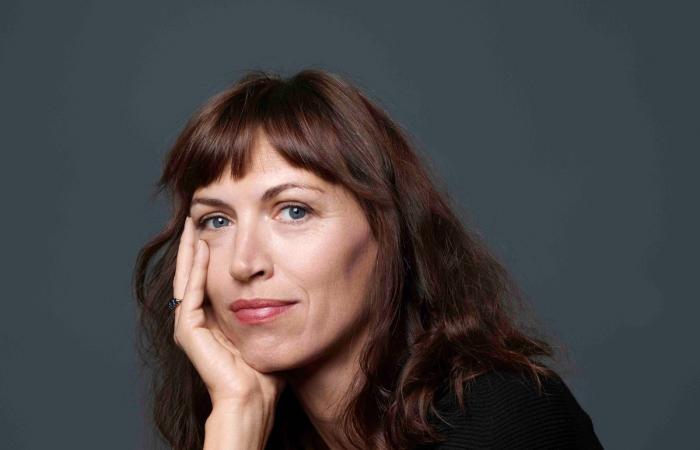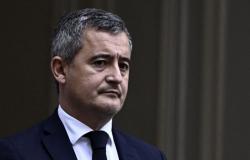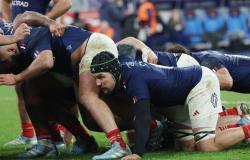Just a few days after the release of Consentshe was called by the police to come and recognize the lifeless body of her father whom she had not seen for ten years. In the apartment where he lived, she is confronted with the materialization of the madness of this toxic, mythomaniac and misanthropic man, who has become a stranger to her. She also discovers two photos of her grandfather whom she adored, who was presented as a hero, but who in these images was dressed with the symbols of the Nazi party.
A book, with very beautiful writing, on the weight of origins, on the deadly unsaid things, on this Eastern Europe tossed around by History.
How did you experience the whirlwind of your first book?
The welcome was unexpected but, at the same time, I learned of my father’s death. It took two brains on my part: I was both immersed in this apartment where he lived with all the horrors I discovered there and at the same time I had to continue to promote the Consent. I was not completely free to take advantage of this success, especially when confinement came two months later. It was a trying moment to talk about a book that spoke about my private life on very painful issues. I have received hundreds of testimonies of stories similar to the one I experienced. Today I feel a certain pride in hearing that the word “consent” has now become a notion anchored in the body of all young people, a word that has become essential, including in the law. It makes me extremely happy that literature can have this power.
In “Patronym” you evoke this moment when the success of your book makes you lose your anonymity and gives rise to imposture syndrome in you.
I have always had a disturbing feeling of strangeness about my own name. I felt that there were gray areas and a murky origin. I knew since I was 20-30 that this name had no homonym, that no one other than my family had it in the world, but I didn’t know what was hidden behind this name. It was only with the death of my father that I gradually investigated the history of the transformation of this name.
Your father Patrick Springora died a few days after the book came out, as if he had been waiting for this moment to come forward to you.
I didn’t kill him with this book even if that was my first reaction because I felt guilty for no longer having contact with him. But he sent me this text just before he died, even though we hadn’t had contact for almost ten years: “I’m proud of you but you should have listened to me back then.” A message of both encouragement from my father seeing that I had become a writer, but it was also a terrible sentence because it was a way of denying that I was a victim, as if I could have prevented things when it was he who, fully aware, and as a father, could have put an end to this relationship with Matzneff, by filing a complaint.
Are you dedicating the book “to all our ghosts”?
The ghosts are my father and my grandfather who were absent from my life during the great dramas of my youth. The hidden part of my grandfather’s life first acted on his own son by making him this unbridled mythomaniac. My father had this passion for lying which was a way of reinventing prestigious identities because behind it was the unspeakable Nazi past of his own father (who had changed the name from Springer to Springora upon arriving in France). Demons and ghosts are metaphors that have reality, because they continue to be there and haunt us. The disappearance of beings is not the end of our story with them.
You recall this play on words from Lacan who said “the non-dupes wander”.
It would have been easier for my father to remain fooled and not wander, but the truth always finds its way, it is the return of the repressed. The truth has to come out one way or another and children are like sponges who quickly understand if there is a secret. If we don’t give them the keys, it remains like a black hole, an evil force that sucks them in. We have to put words. My father knew, because he had seen these two photos of his father with the Nazi signs, but he had never managed to get him to tell his story. This could perhaps have put an end to this spiral of madness in which my father was engulfed because his entire life was a failure, both professional and emotional. He remained trapped in this lie, like glue.
Your father wrote a book.
It touched me to discover that I had something in common with my father who, when he was very young, wrote a detective novel: The lighter. It could perhaps have saved him if Gallimard had published it, to do something with lies, to tell stories. Let the lie become a sublimation of this absence of story from his own father. My book Surname, which presents itself as an almost detective investigation into the story of my grandfather, is unconsciously like a response to my father’s detective novel and perhaps a fulfillment of his desire.
Demons and ghosts continue to be there and haunt us.
Why this obsessive quest?
This happened in two stages. For two years, I left all these found documents sleeping in a cabinet, because I was still completely immersed in Consent. What brought me back were the external echoes: the war in Ukraine and an invitation to Prague where I felt a call to look into this history – my grandfather grew up in Czechoslovakia – and to see the face reality and without burying your head in the sand. I felt capable of studying this story without making an a priori judgment about my grandfather. I wanted to understand how a young man in the 1930s was subjected to recruitment strategies. I immersed myself in the history of Czechoslovakia and the Sudetenland. I went to my grandfather’s hometown and, from there, I wanted to better understand the destiny of this initially rather peaceful community which allowed itself to be contaminated by Hitler’s hatred of the Jews because a scapegoat had to be found for the humiliation at the end of the First World War. It is these mechanisms of reproduction of violence that really interested me. We’re talking about people who lived incredibly romantic lives with a lot of migrations and exiles. My grandfather went to Berlin, became a police officer, joined the Nazi party, trained in sports like fencing. In 1944, he met my grandmother in Normandy, he had this love affair with this 19-year-old girl and he decided to desert. There is this extraordinary twist of working for the Allies and succeeding in clearing his past, by changing his name, and validating his legend of having been forcibly sent to Germany and obtaining victim status and starting his life again In France.
You don’t judge this life.
There is something very complex which prevents a Manichean view, with positions between victims and executioners which can alternate in a gray area. And I have not succeeded in establishing whether he himself had committed crimes, even if he was an accomplice to this regime. I will never know if he was simply a young man tossed around or if he was a war criminal who hid his identity. I am obliged to take into account this life with all the elusive sides of this biography. It would have seemed beside the point to pass judgment on this story.
The unsaid is devastating.
The unspoken already arouses plenty of fantasies among children. My grandfather could have, at one point, said what it was. But it was a generation where we didn’t talk. I checked it with my other grandfather and tried to get him to talk about that period of the war, but there was a need in this war-traumatized generation to move on and the response was consistently : “All that is in the past and now we live in peace, it’s wonderful, you’re lucky.” While the transmission of these stories is fundamental, because all the conflicts we face today are inherited from these past conflicts in the 20th century.
Why did you choose to keep this name?
No one else wears it and no one will wear it after me. I assume this responsibility to preserve it, because I carry this story that I made my own by writing a book, which talks about the 20th century where I was born and current threats. I don’t want to get into a cycle of escaping and erasing again.
Why you should read Camille Kouchner, who wrote a true literary work
What role does writing play in your life?
I would like it to take center stage. I made the radical choice two years ago to leave a management position in a publishing house where I had worked for 15 years in all positions. I wanted to write, even if it will be difficult to leave Surname which kept me very busy for two years and which I could have continued almost indefinitely. I would love to go for the novel. By writing, we give birth to our thoughts, we clarify them, we take them out of a sort of somewhat shapeless magma. It also allows you to move on. We are not set in stone. Writing also helps to illuminate who I am. This allows me to explore the contours of my identity, to say where I come from. It was important with Surnamebecause after Consent, many people reduced me to my status as the victim of a child molester. It’s an event that took place between the ages of 13 and 15, but that’s not all I am. I needed to remember that there was also a before, that I was also made up of the history of my father and my grandfather. Writing is not only the exploration of thought, but also the exploration of the contours of what forms a life and makes me who I am.
**** Surname, Story, Vanessa Springora, Grasset, 368 pp., €22, digital €16.







